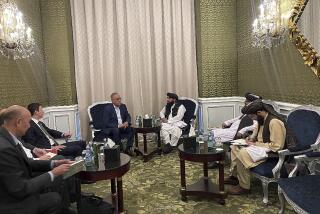Empowering Women Is Focus of Conference : Population: U.N. meeting, opening Monday, to target for first time their contribution to family planning issues.
CAIRO — Years ago, when the water buffalo gave plenty of milk and the pigeons and chickens were paraded nightly to the dinner table, Om Mahmoud was healthy and happy with the annual ritual of giving birth to a new baby: another pair of hands in the lush farm fields of the Nile Delta.
But the babies kept dying, one by one. Om Mahmoud would have a new baby, and last year’s infant would die. In all, she went to the birthing table 15 times. Seven lived. And finally, against her husband’s inclinations, she went to a family planning clinic and had an IUD inserted.
“He wanted more children, but I did not, because of my health. He used to think that it would be interfering in God’s ways. But he is ill, and all the responsibility for the income is on me. I insisted, and he was convinced,” recalls the 47-year-old woman who supports her husband and children by sweeping stairways for about $50 a month.
Now, Om Mahmoud--even her name, “Mother of Mahmoud,” is defined by her children--insists that her four daughters go to school, as her father never allowed her to do.
“I tell them to learn and to look and see how times are now, so they won’t have to do what I have, nine of us living in one room with the toilet under the stairs . . . ,” she says. “When a girl gets an education, she can read, she can learn about programs the government is providing, and from there she can take a decision.”
The deceptively simple idea of a woman making a decision about her future is one of the cornerstones of the emerging debate on global population policy. To an increasing degree, world leaders are becoming convinced that an important key to reducing birthrates is not simply passing out birth control pills or promoting sterilization programs or allowing abortion, but empowering women to make their own decisions about family and children.
As more than 20,000 delegates from 170 nations gather in Cairo beginning Monday to draft a new strategy for world population and development in the coming two decades, the focus for the first time is on what women can contribute to the debate.
There are at least two female heads of state and large numbers of women among the delegations to the U.N.-sponsored International Conference on Population and Development. Women from both the developing world and the industrialized nations are seeking to focus not just on controlling the number of births but on issues such as providing women with reproductive health services, counseling on sexually transmitted diseases, and better prenatal and postnatal care.
To a great degree, the conference will recognize that better educated women historically choose to have smaller families. Educate women, the reasoning goes, teach them to read, let them become responsible for themselves, and they will no longer be content to remain locked in the poverty of huge families and no future. But the debate goes further than that--and away from the issue of pure numbers.
For too long, say feminist organizations mobilizing at this week’s conference, women in the developing world have been targeted for mass-marketed family planning programs--even some whose health impact is dubious--without regard for their health or their own family choices.
“Women have made it clear that setting demographic targets or dispensing contraceptives is not enough,” said Jane Ordway, a spokeswoman for the International Women’s Health Coalition.
The draft document that will come under discussion when the conference opens not only addresses reproductive health services, controls on domestic violence, bans on female genital mutilation and empowerment of women in the workplace and at home, it raises the issue of male responsibility for family planning.
The U.N. plan promotes the use of condoms and better enforcement of laws mandating child support.
In countries such as Egypt, men are usually reluctant to become involved in their wives’ birth control decisions, though their consent is required at all Egyptian family planning clinics before birth control is dispensed.
“If women have access to more education, they will at least have a share in making a decision about their own health, and their families’ health,” said Dr. Mowalab Mouelhi, a physician at the Zeinhom Family Planning Clinic in downtown Cairo.
But the empowerment of women as a touchstone for population policy is not without its opponents, primarily those who fear that new women’s health programs will shift crucial funding away from where it has been most successful: family planning programs. The birth control clinics scoffed at as coercive by some feminist groups have succeeded in bringing down fertility rates in developing countries by about a third since the 1960s.
“The women’s health policies recommended in the Cairo draft program have an inherent contradiction: You can’t serve two masters,” the Cato Institute, a conservative Washington-based think tank, argues. “Although the program expresses opposition to coercion and claims to support freedom for people to determine their family size, that is contradicted by its call for development strategies that incorporate demographic goals. Governments can allow freedom in reproductive matters, or they can promote population growth objectives. They cannot do both.”
The conference also promises to provide a showdown pitting proponents of more open sex education, freer access to safe abortion and family planning against the Vatican and Islamic organizations, which have vowed to combat provisions for sex education and health services outside the scope of the traditional family. The Vatican remains opposed to most birth control methods and has demanded deletion of all references to abortion rights.
Outraged at the references to sex education for adolescents, abortion and homosexuality, four Muslim nations--Saudi Arabia, Lebanon, Sudan and Iraq--have announced they are not attending. Two Muslim women prime ministers, Tansu Ciller of Turkey and Khaleda Zia of Bangladesh, also backed out.
Women’s organizations gathering in Cairo see the religious debate as a reflection of a male-dominated political arena. “Fundamentalism, whether it’s about religion or politics, is fundamentally about power,” Ordway said.
More to Read
Sign up for Essential California
The most important California stories and recommendations in your inbox every morning.
You may occasionally receive promotional content from the Los Angeles Times.










